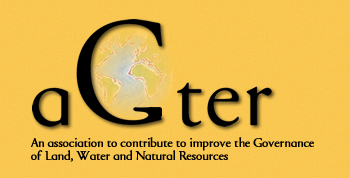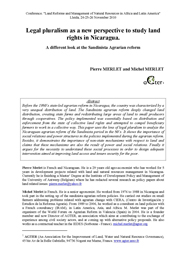|
|
||||||||||||||
|
|
Several members of AGTER participated in the Conference on Land Refoms and Management of Natural Resources in Africa and Latin America, which was organised in Lleida (Spain) in November 2010. Pierre Merlet presented the paper that can be downloaded below, underlining the interest of legal pluralism approach to have a new look at the Sandinista Agrarian Reform. AbstractBefore the 1980’s state-led agrarian reform in Nicaragua, the country was characterized by a very unequal distribution of land. The Sandinista agrarian reform deeply changed land distribution, creating state farms and redistributing large areas of land to small producers through cooperatives. The policy implemented was essentially based on distribution and enforcement from the state of collective land rights and attempted to compel beneficiary farmers to work in a collective way. This paper uses the lens of legal pluralism to analyze the Nicaraguan agrarian reform of the Sandinista period in the 80’s. It shows the importance of social relations and power structures in the policies implemented during the agrarian reform. Besides, it demonstrates the importance of non-state mechanisms with respect to land and claims that these mechanisms are also the result of power and social relations. Finally it argues for the necessity to understand these social processes in order to design adequate intervention aimed at improving land access and tenure security for the poor. |
AGTER. Addres: 45 bis, avenue de la Belle Gabrielle, 94736 NOGENT SUR MARNE CEDEX, FRANCE
Telephone: +33(0)1 43 94 72 59 / +33(0)1 43 94 72 96
E-mail: agter@agter.org





